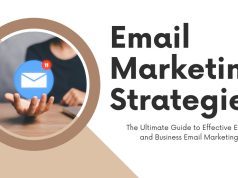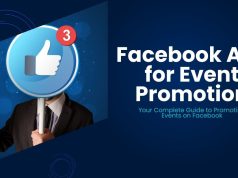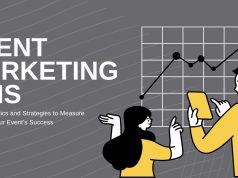Corporate events can transform your business relationships, generate qualified leads, and position your brand as an industry leader. Yet many companies struggle to create events that deliver measurable results and lasting impact.
Event marketing has evolved far beyond simple networking mixers and product launches. Modern corporate events serve as powerful business tools that drive revenue, strengthen customer relationships, and accelerate growth. Whether you’re planning your first corporate event or looking to improve your current strategy, understanding the fundamentals of effective event marketing will help you create experiences that resonate with your audience and achieve your business objectives.
This comprehensive guide will walk you through every aspect of corporate event marketing, from initial planning to post-event follow-up, providing you with actionable strategies to maximize your event’s success and return on investment.
Understanding Corporate Event Marketing
Corporate event marketing encompasses all activities related to planning, promoting, and executing business events designed to achieve specific marketing and business goals. These events create opportunities for face-to-face interactions between your company and key stakeholders, including customers, prospects, partners, employees, and industry influencers.
Successful corporate events serve multiple purposes simultaneously. They generate brand awareness, facilitate relationship building, provide educational value, and create memorable experiences that differentiate your company from competitors. The most effective events align closely with broader marketing strategies and support overall business objectives.
Corporate events take many forms, each serving different purposes and audiences. Conference-style events position your company as a thought leader while providing valuable industry insights. Product launches create excitement and media attention around new offerings. Customer appreciation events strengthen existing relationships and encourage loyalty. Training workshops demonstrate expertise while providing practical value to attendees.
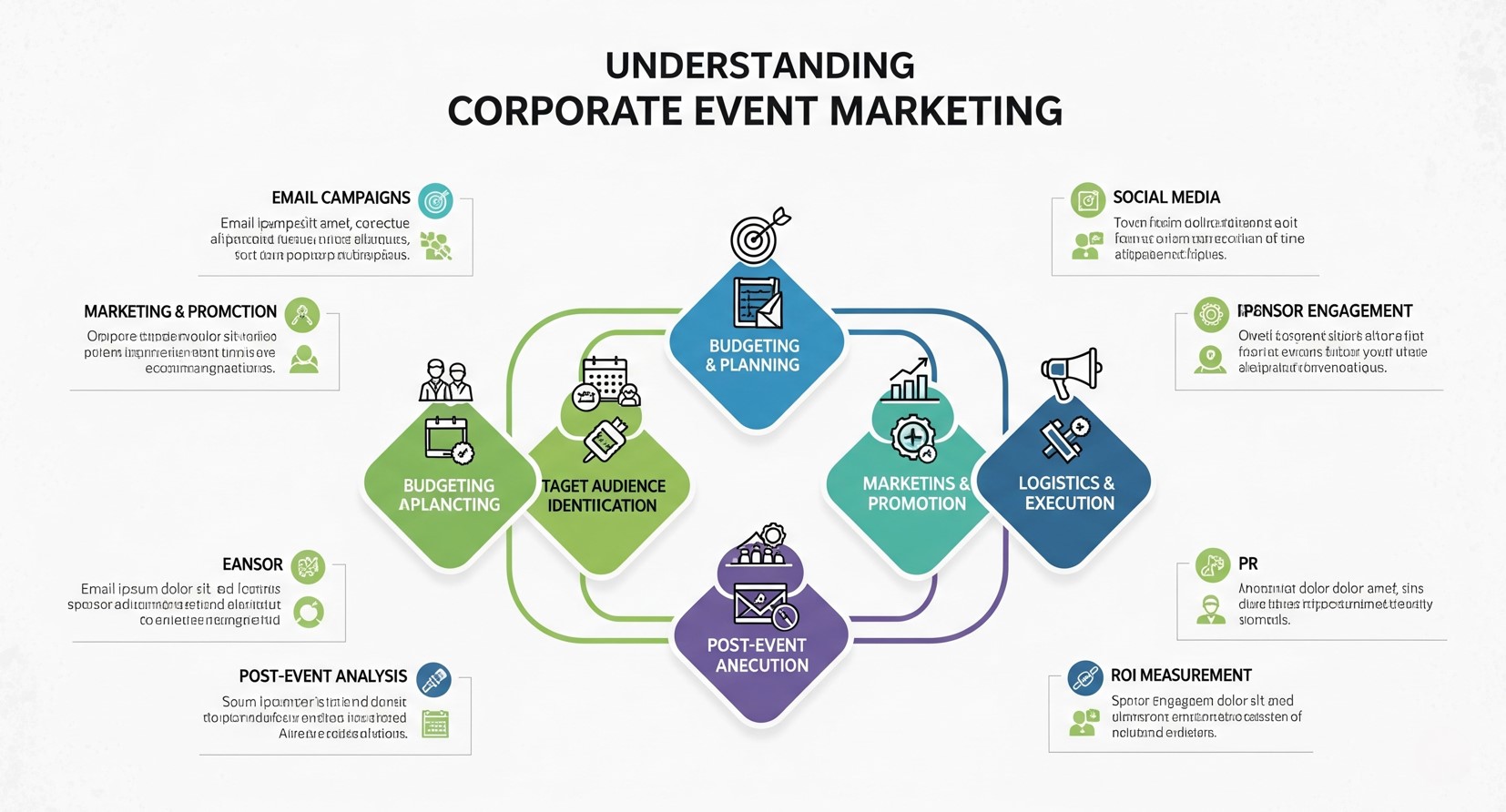
Types of Corporate Events
Different event formats serve different strategic purposes and audience needs. Understanding these distinctions helps you choose the right approach for your specific goals and resources.
Conferences and Seminars establish your company as an industry authority while providing educational content to attendees. These events typically feature expert speakers, panel discussions, and networking opportunities. They work particularly well for B2B companies looking to influence decision-makers and showcase thought leadership.
Product Launches and Demonstrations create excitement around new offerings while giving potential customers hands-on experience with your products or services. These events often incorporate interactive elements, live demonstrations, and opportunities for immediate feedback from your target audience.
Networking Events and Mixers focus primarily on relationship building and community development. These more casual gatherings encourage organic conversations and connections between attendees while keeping your brand top-of-mind during business discussions.
Trade Shows and Exhibitions provide opportunities to showcase your offerings alongside competitors while connecting with large numbers of qualified prospects. Success at trade shows requires strategic booth design, engaging presentations, and systematic lead capture processes.
Customer Appreciation Events strengthen relationships with existing clients while encouraging referrals and repeat business. These events demonstrate your commitment to customer success and create positive associations with your brand.
Setting Clear Event Objectives
Effective event marketing begins with clearly defined objectives that align with your broader business goals. Vague objectives like “increase brand awareness” make it difficult to measure success and optimize your approach. Instead, establish specific, measurable goals that guide every aspect of your event planning process.
Lead generation objectives might include collecting a specific number of qualified contact details, scheduling follow-up meetings with prospects, or generating a target amount of potential revenue from event attendees. Brand awareness goals could focus on media coverage, social media engagement, or post-event survey results measuring brand recall and perception.
Customer retention objectives often center around strengthening existing relationships through exclusive experiences, educational content, or special offers available only to event attendees. Employee engagement goals might include improving internal communication, celebrating achievements, or building team cohesion through shared experiences.
Revenue objectives can be direct, such as product sales made during the event, or indirect, such as deals closed within a specific timeframe after the event. Partnership development goals might focus on meeting potential strategic partners, strengthening existing business relationships, or exploring collaboration opportunities.
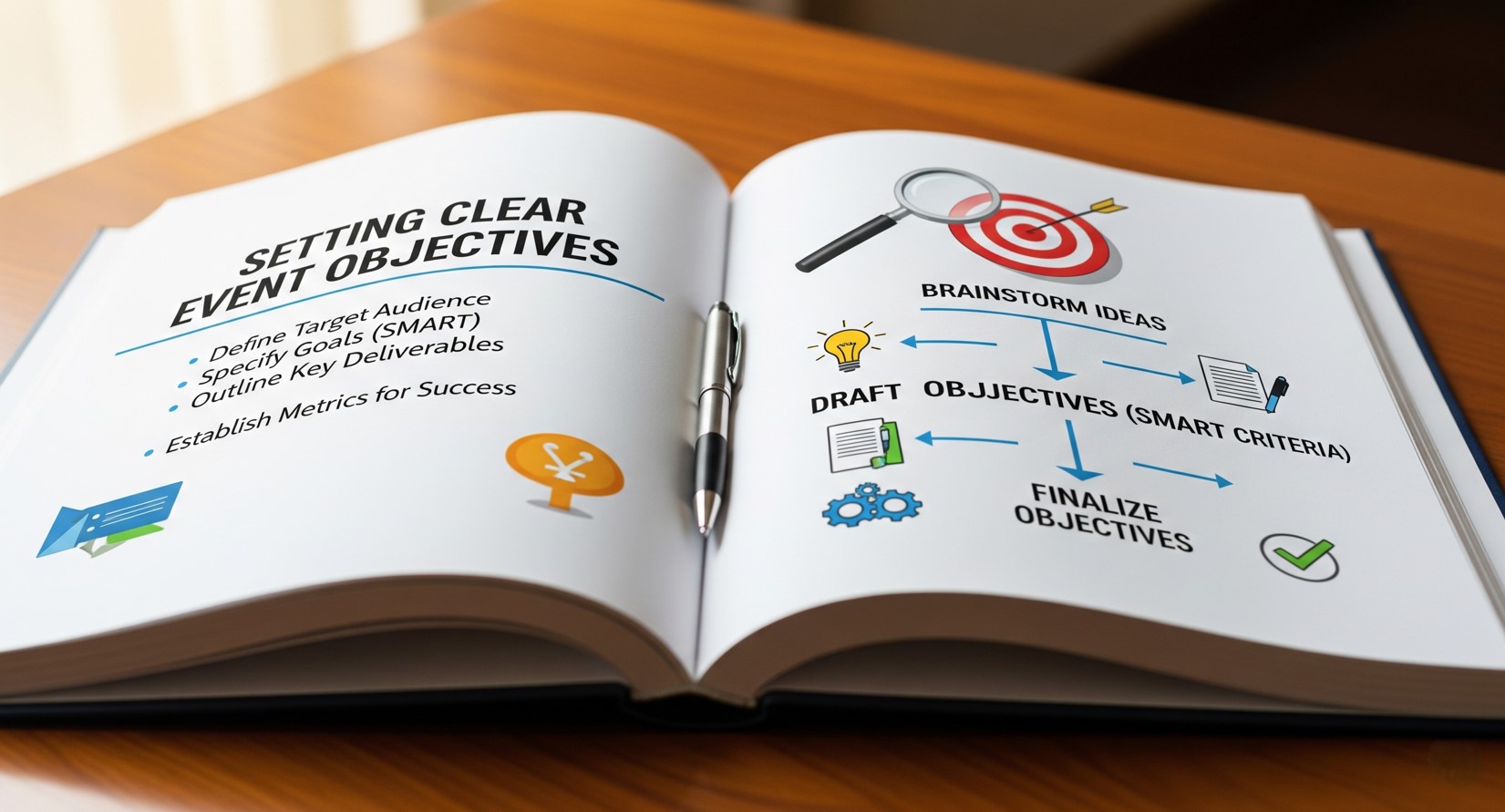
Identifying Your Target Audience
Successful corporate events begin with a deep understanding of your target audience’s needs, preferences, and behaviors. Generic events that try to appeal to everyone often fail to create meaningful connections with anyone. Instead, focus on specific audience segments that align with your business objectives.
Start by analyzing your existing customer base to identify patterns in demographics, industry sectors, company sizes, and roles within organizations. This analysis reveals which audience segments generate the most value for your business and should be prioritized for event invitations.
Consider the different stakeholder groups that influence purchasing decisions in your target market. Decision-makers, influencers, end-users, and budget holders all play important roles in B2B sales processes. Your event strategy should account for the interests and concerns of each group while creating opportunities for them to interact with your team.
Geographic considerations affect both attendance rates and event logistics. Local events typically generate higher attendance rates and lower costs, while national or international events can attract higher-profile attendees and generate greater media attention. Virtual events eliminate geographic barriers but may reduce networking opportunities and emotional connection.
Industry-specific factors influence event content, timing, and format preferences. Some industries value detailed technical presentations, while others prefer high-level strategic discussions. Understanding these preferences helps you create more engaging and relevant event experiences.
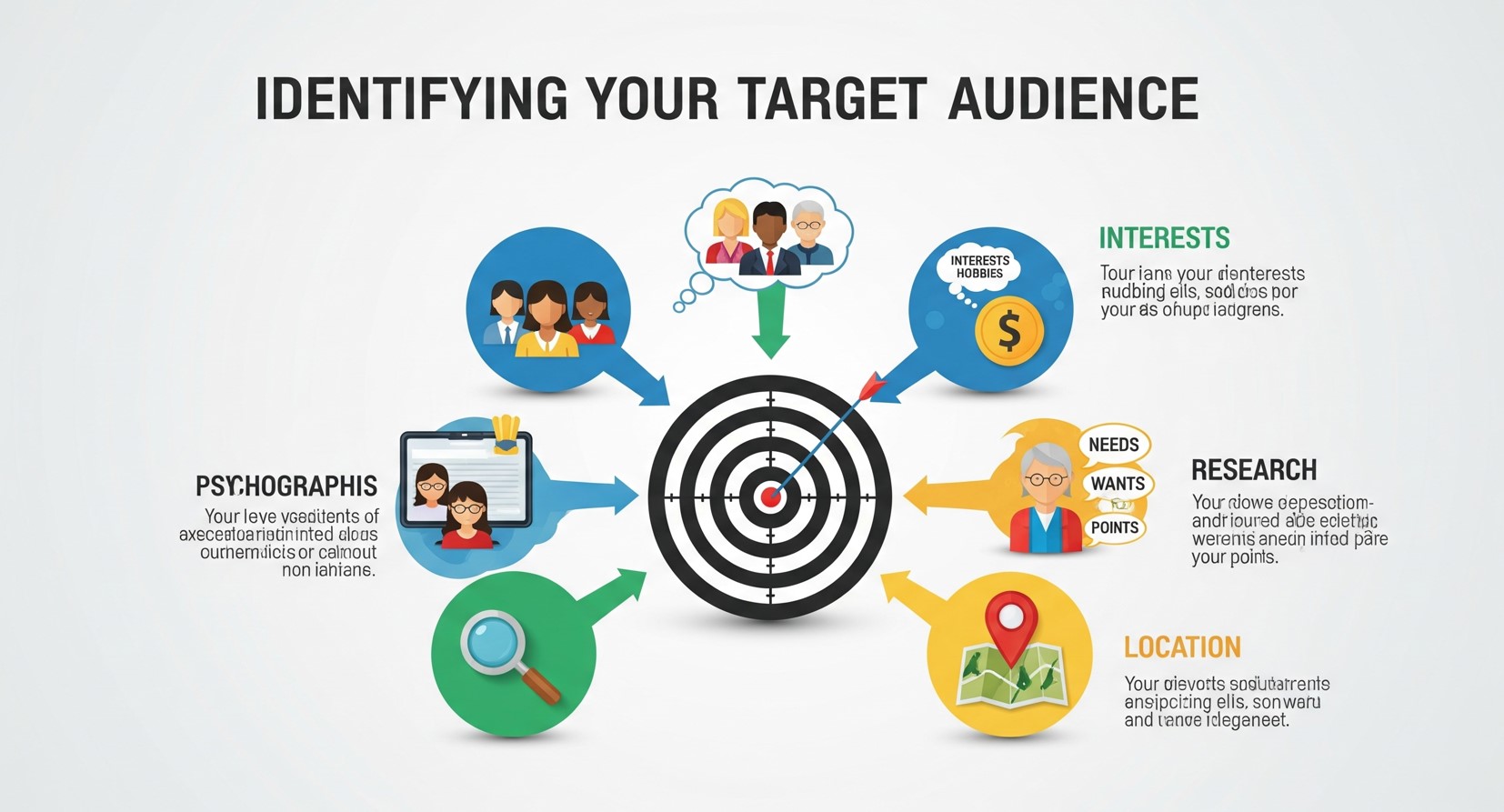
Planning Your Corporate Event
Strategic event planning requires careful coordination of numerous moving parts while maintaining focus on your core objectives. Start by establishing a realistic timeline that allows sufficient time for venue booking, speaker recruitment, marketing campaigns, and logistical arrangements.
Venue selection significantly impacts attendee experience and event success. Consider factors beyond basic capacity requirements, including location accessibility, technology infrastructure, catering options, and overall atmosphere. Learn more about event venue marketing strategies.
Budget allocation requires balancing various competing priorities while ensuring adequate resources for critical success factors. Major budget categories typically include venue costs, catering, speakers and entertainment, marketing and promotion, technology and equipment, staffing, and contingency funds for unexpected expenses.
Technology requirements have become increasingly important as events incorporate digital elements even when held in person. Consider audio-visual needs, internet connectivity, registration systems, lead capture tools, live streaming capabilities, and mobile apps that enhance attendee experience and facilitate networking.
Speaker selection and content development directly impact attendee satisfaction and event outcomes. Choose speakers who resonate with your target audience while delivering content that supports your event objectives. Balance educational value with entertainment to maintain engagement throughout the event.
Pre-Event Marketing and Promotion

Effective promotion begins months before your event date and continues right up until the event starts. Multi-channel marketing approaches generate better results than relying on single promotional tactics. For actionable strategies, see our digital event marketing guide.
Email marketing remains one of the most effective channels for event promotion, particularly for B2B audiences. Create a series of emails that build excitement and urgency while providing valuable information about speakers, agenda items, and networking opportunities. Personalize messages based on recipient interests and previous engagement with your company.
Social media promotion extends your reach beyond existing contacts while creating opportunities for viral sharing. Platform-specific content performs better than generic posts shared across all channels. LinkedIn works well for professional B2B events, while Instagram and Twitter can help create visual excitement around your event brand.
Content marketing supports event promotion while providing value to potential attendees before they commit to attending. Blog posts, whitepapers, and videos featuring event speakers or previewing session content demonstrate the quality of your event while building anticipation.
Partnership promotion leverages relationships with complementary businesses, industry associations, and media outlets to expand your promotional reach. Speaking opportunities at related events, guest blog posts, and cross-promotional agreements can significantly increase event visibility within your target market.
During the Event: Execution Best Practices
Event day execution requires seamless coordination between multiple team members while maintaining flexibility to address unexpected challenges. Establish clear roles and responsibilities for each team member, including backup plans for key positions.
Registration and check-in processes create first impressions that set the tone for the entire event experience. Streamlined systems that minimize wait times while capturing necessary attendee information contribute to positive overall impressions. Consider mobile check-in options and multiple registration stations to reduce bottlenecks.
Networking facilitation goes beyond providing space for conversations. Structured networking activities, conversation starters, and introduction services help attendees make valuable connections while creating positive associations with your event and brand.
Real-time engagement monitoring allows you to adjust your approach based on attendee responses and energy levels. Social media monitoring, feedback forms, and direct observation help you identify opportunities to improve the experience during the event itself.
Lead capture and data collection systems should be efficient and comprehensive without being intrusive. Train your team to gather contact information and qualification details consistently while maintaining focus on relationship building and value delivery.
Post-Event Follow-Up and Analysis

Post-event activities often determine whether your event generates lasting business value or quickly fades from attendee memory. Systematic follow-up processes help convert event connections into business relationships and revenue opportunities.
Immediate follow-up communications should occur within 24-48 hours while the event experience remains fresh in attendees’ minds. Thank you messages, presentation materials, and promised resources demonstrate professionalism while providing additional value to event participants.
Lead qualification and distribution processes ensure that sales teams receive complete information about prospects while they’re still engaged and interested. Detailed notes about conversations, expressed interests, and next steps help sales representatives continue relationships effectively.
Performance measurement requires tracking both quantitative metrics and qualitative feedback. Attendance numbers, lead generation results, social media engagement, and revenue attribution provide measurable outcomes, while attendee satisfaction surveys and team debriefings reveal opportunities for improvement.
Long-term relationship development extends far beyond the event itself. Regular communication with event attendees through newsletters, relevant content, and future event invitations helps maintain relationships and generate ongoing business opportunities. Integrating how customer feedback builds unshakeable trust can strengthen long-term connections post-event.
Measuring Event Success and ROI
Effective measurement begins with establishing baseline metrics and clear success criteria before your event takes place. Return on investment calculations should account for both direct and indirect benefits while considering the full timeline of event impact.
Direct revenue attribution tracks sales that can be directly linked to event participation. This might include products sold during the event, contracts signed by event attendees, or deals closed within a specific timeframe after the event. Customer lifetime value calculations provide more accurate ROI assessments than initial transaction values alone.
Lead quality metrics evaluate not just the quantity of contacts generated but their potential value and likelihood to convert. Scoring systems that consider factors like company size, budget authority, and expressed interest levels provide more meaningful insights than simple contact counts.
Brand awareness measurement requires both quantitative and qualitative assessment methods. Social media metrics, website traffic increases, and media coverage provide quantifiable results, while surveys and focus groups reveal changes in brand perception and recall.
Long-term relationship metrics track the ongoing value generated from event connections. Customer retention rates, referral generation, and partnership development often provide greater value than immediate sales results but require longer measurement periods to assess accurately.
Transforming Your Event Marketing Strategy
Corporate event marketing success requires strategic planning, flawless execution, and systematic follow-up processes that convert event experiences into lasting business relationships. Start with one well-executed event and expand using event marketing solutions.
The most successful event marketing strategies evolve continuously based on performance data, attendee feedback, and changing market conditions. Start with one well-executed event that demonstrates clear ROI, then build upon that success to develop a comprehensive event marketing program that supports your broader business objectives.
Begin planning your next corporate event by defining specific, measurable objectives that align with your business goals. Invest time in understanding your target audience’s preferences and pain points, then design an experience that provides genuine value while advancing your marketing objectives.
Frequently Asked Questions (FAQ)
What is the difference between a corporate event and a marketing event?
A corporate event focuses on internal or external stakeholders for business objectives such as team building, client appreciation, or networking. Marketing events are designed specifically to promote a brand, product, or service, often incorporating lead generation, content distribution, and promotional activities. Corporate event marketing blends these objectives to achieve both relationship-building and business growth.
How do I measure ROI for corporate events?
ROI can be measured through a combination of direct and indirect metrics. Direct measures include leads generated, sales closed, or event-driven revenue. Indirect metrics include brand awareness, media mentions, social engagement, attendee satisfaction, and long-term relationship development. Tracking both types provides a holistic view of event success.
What makes a corporate event memorable?
Memorability comes from a mix of engaging content, personalized experiences, emotional connections, and interactive elements. Experiences that are unique, relevant, and valuable to attendees create lasting impressions that strengthen your brand and increase loyalty.
Should virtual events replace in-person events?
Not necessarily. Virtual events are excellent for reaching broader audiences, reducing costs, and offering convenience. In-person events excel in creating personal connections, facilitating networking, and delivering experiential engagement. Many companies now adopt hybrid models to combine the advantages of both formats.
How can I increase attendance for corporate events?
Start with a clear understanding of your target audience, provide valuable content, leverage multi-channel promotion, create early-bird incentives, and use partnerships to expand reach. Personalized invitations and engaging pre-event communications also significantly boost attendance.
How long after the event should follow-up occur?
Follow-up should begin within 24-48 hours while the event experience is fresh. Initial messages can thank attendees, provide materials, or schedule follow-ups. Additional nurturing can continue over weeks or months, depending on the event objectives and sales cycles.
How can I ensure high attendee engagement during my event?
Engagement increases when content is interactive, personalized, and relevant. Incorporate workshops, Q&A sessions, networking opportunities, gamification, and live polling. Using mobile apps or interactive platforms allows attendees to actively participate and connect with both speakers and peers.
What are the advantages of hybrid events?
Hybrid events combine in-person experiences with virtual participation, extending reach, accommodating attendees who cannot travel, and increasing overall engagement. They also provide data on attendee behavior, preferences, and participation patterns for more informed future planning.
How do I choose the right event format for my goals?
Align your event type with objectives. For thought leadership and education, consider conferences or seminars. For product promotion, opt for launches and demos. For relationship-building, networking mixers or customer appreciation events are ideal. Each format has unique strengths and audience expectations.


